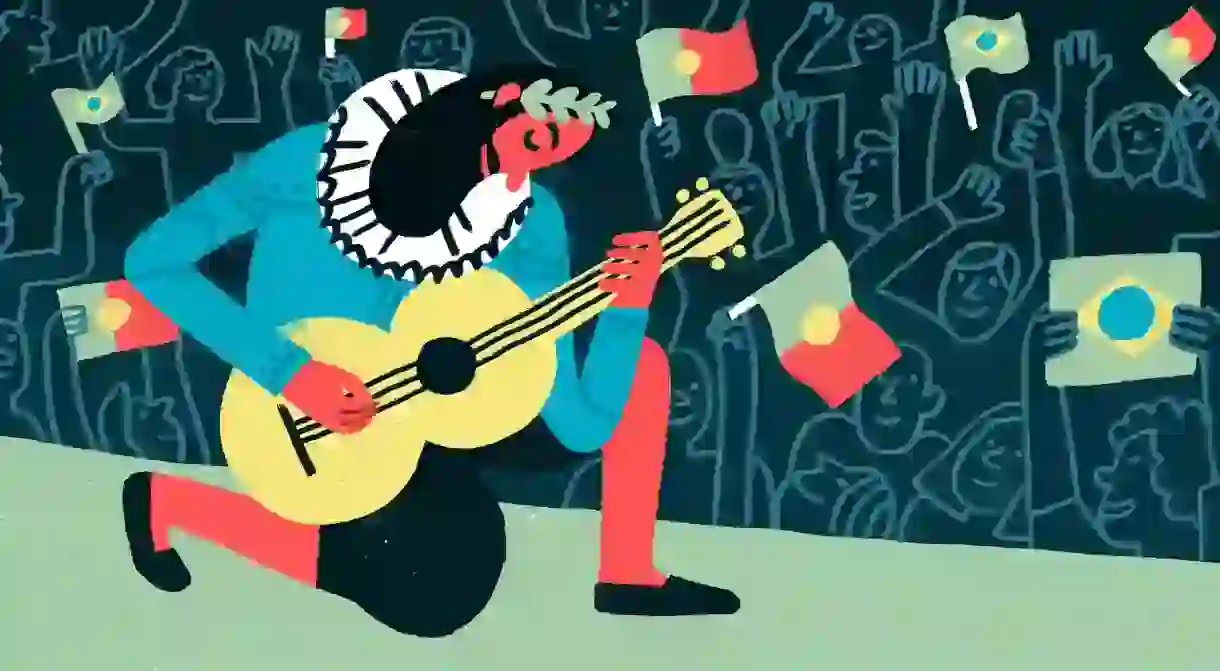Portuguese Pop Songs That Will Help You Learn Portuguese

Music is a great way to learn a new language – it uses everyday vocabulary, enforces repetition and drills pronunciation. Whether you’re studying Portuguese from Brazil or Portugal, take a look at these pop songs – not only do they highlight regional differences, they’re also a fun way to learn at the same time.
Jorge Ben Jor – Mas que Nada
One of the most iconic Brazilian singers, Jorge Ben Jor is the original artist behind Mas que Nada. This song has been replicated by several artists, including The Black Eyed Peas. With its lively rhythmic beat and references to samba, it embraces the spirit and soul of Brazil. It is a great song for beginners to learn the present simple tense, as well as some popular expressions – such as ‘legal‘ which means nice or cool – and for pronunciation, as Ben Jor sings relatively slow and clearly. Although as an iconic Brazilian song, it is great for all Portuguese learners at any level to understand some of Brazil’s culture.
MC G15 – Deu Onda (Kondzilla)
This was the song that took over the popular parties in Brazil at the end of 2016 and throughout the beginning of 2017. It was especially popular in Rio de Janeiro where it could be heard almost every day at stalls on the streets or being blasted out of cars cruising through the city. Deu Onda is a Brazilian funk song that has become Rio’s newest symbolic music genre, bringing with it a dance and fashion culture. It is a good song for more advanced learners to learn regional slang such as ‘deu onda’ (makes me want you) and ‘mozão’ (an affectionate term for girlfriend/boyfriend).
Tribalistas – Ja Sei Namorar
The three Brazilian music stars – Arnaldo Antunes, Marisa Monte, and Carlinhos Brown – joined together to create the short-lived but highly popular Tribalistas. Their collaboration produced Ja Sei Namorar, which was well-received in Brazil and was later used in the FIFA Football 2004 video game. It is a great song to learn present tense – so ideal for beginners – as well as expanding everyday vocabulary such as namorar (to go out with) and beijar (to kiss).
Chico Buarque – Construção
Chico Buarque was once Brazil’s greatest heart throb and his song Construção is considered one of his best works in terms of popularity. The catchy rhythm makes it compelling, as does the smooth, pleasant voice of Buarque. This song is great for intermediate or advanced learners of Portuguese as he uses a lot of conditional tenses, which helps practice using this construction. He begins the song with “Amou daquela vez como se fosse a última, Beijou sua mulher como se fosse a última“,which translates to “You loved that time as if it were your last, you kissed your girl as if it were the last time”.
https://www.youtube.com/watch?v=jzWI_JjFBr0
Salvador Sobral – Amar pelos Dois
Many people may have already heard of Salvador Sobral as the winner of Eurovision 2017 with the song Amar pelos Dois. It was the first time that Portugal had won since the show began in 1964, and he was also the highest scoring winner ever on Eurovision with a total of 758 points. His song Amar pelos Dois is a great song to understand future subjunctive expressions with lyrics such as “Se um dia alguém perguntar por mim, Diz que vivi para te amar” (“If one day someone asks me, says that I lived to love you”). It also highlights some interesting regional differences such as the use of teu (‘your’ or ‘their’) which is common in Portugal whereas, in Brazil, it is common to use seu. However, this is not a rule – many places in Brazil do use teu and it is normal in Rio de Janeiro, for example, to hear a mix of both.
Diogo Piçarra – Tu e Eu
Diogo Piçarra was the winner of the fifth season of the Portuguese version of Pop Idol in 2012. His song Tu e Eu is great for intermediate learners to understand better the future subjunctive, with lyrics such as “Se a idade não perdoar, E quando não me ouvires cantar“, which translates to “If age doesn’t forgive, and when you don’t hear me sing”. It also again highlights regional variations. It is common in Portugal to use the pronoun tu for ‘you’ and to conjugate the verb accordingly – such as ‘you think’, tu pensas – whereas, in Brazil, it is usual to use você (which also means ‘you’), or many places use tu but conjugate the verb as if it were você – such as ‘you think’, tu pensa.
Raquel Tavares – Meu Amor de Longe
Raquel Tavares was born in Lisbon and decided to pursue her music career early with poetic, expressive songs. Her song Meu Amor de Longe is a romantic hit and great for Portuguese learners wanting to practice past tense and increase their descriptive vocabulary. The song includes words such as “Tudo a tempo passa, não há nada a perder, Meu amor de longe voltou, Só para me ver“, which translates to “Everything in time passes, there is nothing to lose, My love from afar returned, Just to see me”.













